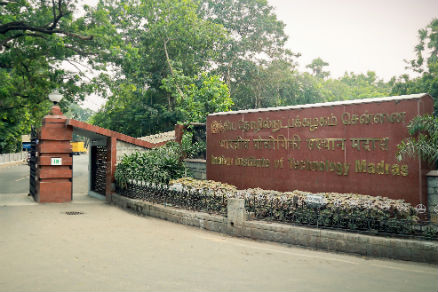IIT Madras’ International Clean Water Centre working with TN Govt to map groundwater quality of Chennai
Chennai: IIT Madras’ International Centre for Clean Water (ICCW), a Centre of Excellence dedicated to Research and Development of Clean Water Technologies and incubating startups, celebrated its second anniversary today (22nd April 2021) through an online event. The Centre was launched on World Earth Day, which is observed every year on 22nd April.
To mark this occasion, ICCW launched a music video titled ‘Rivers of India’ to promote awareness about river conservation. It was created by IIT Madras Distinguished Alumnus Awardee Dr. Kanniks Kannikeswaran and features prominent singers including Smt. ‘Bombay’ Jayashri, Sri. Amrit Ramnath, Sri. Sai Shravanam, Smt. Kaushiki Chakraborty and Master Rishith Desikan. The Music video ‘Rivers of India’ can be viewed in the following link – https://www.youtube.com/watch?v=7wmCGm8k2eU
The event was live-streamed on IIT Madras YouTube Channel – https://www.youtube.com/channel/UCZgwOAjweG6NZKX5VWXLQLw
ICCW is working with startups to develop technologies, which, when implemented, have the potential to save millions of litres of groundwater every year. Further, ICCW is also working with the Tamil Nadu State Government’s Data Centre and postgraduate students of Stella Maris College, Chennai, to map the groundwater quality of the city as a pilot project.
Addressing the celebrations virtually, Dr. Shekhar C. Mande, Director General, Council of Scientific and Industrial Research (CSIR), said, “The total water available on earth is 1,360,000,000 km3, of which 97.2 per cent is ocean water. Freshwater availability is only 0.02 per cent of total water available. The total amount of freshwater usable for humans is really tiny. This actually highlights the importance of conservation of water. It is our collective duty.”
Appreciating the “phenomenal work” being done by Prof. T. Pradeep, Dr. Shekhar C. Mande, added, “Water is extraordinarily important. It is good to see IITs efforts in all fronts, not only in generating the next level of human resources and extraordinary translational work.”
One in three people globally lack access to safe drinking water. According to a recent report by the United Nations, nearly 2.1 billion, lack access to safe, readily available water at home. In its mission to ensure clean drinking water for people, ICCW has been developing sustainable technologies and taking them to affected communities with commensurate behaviour change activities.
Speaking on the occasion, Prof. Bhaskar Ramamurthi, Director, IIT Madras, said, “IIT Madras Research Park has many things. It is a place where several companies have set up their research centres and collaborate with IIT Madras. It is a place where we incubate all our startups and also a place where some of these translational research centres have been set up, including the ICCW. Such efforts to take ideas more quickly to the market and the field have benefitted a lot from the IIT Madras Research Park.”
Further, Prof. Bhaskar Ramamurthi said, “There are at least half a dozen such centres which are catalyzing the conversion of our ideas to reality. As a result of all this, I believe that the number of areas in which our faculty are having more immediate impact definitely in India, if not beyond the country as well, is quite high relative to most institutions. You can see our efforts bearing fruits not just in water, but in healthcare, housing, sustainable and energy, and several other areas.”
Funded by HT Parekh Foundation and inaugurated by Mr Deepak Parekh on April 22, 2019, the ICCW is the brainchild of Prof. T. Pradeep, a Padma Shri Awardee and Institute Professor, IIT Madras. This 21,000 sqft-centre has been established at IIT Madras Research Park and has seven exclusive laboratories dedicated to sustainable clean water technologies. It collaborates closely with the industry as well as academia.
Speaking on the occasion, Prof. T. Pradeep, Professor-in-Charge, ICCW, and Institute Professor, IIT Madras, said, “Ensuring clean water for all is the most essential, but seemingly insurmountable global challenge. Along this direction, ICCW is taking baby steps in offering functional, sustainable and socially responsible solutions.”
The ICCW focuses on clean water implementation projects through sustainable means, effluent management, cutting-edge research and community welfare programmes in partnership with various governments, co-operatives, NGOs, and corporates. US-based companies Marmon Group and Buckman Laboratories are consortia members of ICCW.
Speaking about the making of the music video, IIT Madras Distinguished Alumnus Awardee Dr. Kanniks Kannikeswaran, said, “The keyword is the reverence for rivers. The song takes the viewer through rivers, their overuse, environmental pollution, the course correction, hope, collaboration, awareness, people coming together and finally a message of hope to come together… The key thing here is calling out rivers by their names.”
The technologies developed by ICCW include an ‘IOT-based smart water measurement, monitoring and control system’ and low-cost mobile-enabled sensors for toxic contaminants such as fluoride and arsenic, paint shop water recycling for industries and greywater recycling.
An integrated hydroinformatics approach is taken to connect technology with social needs that aligns well with the smart city movement. Wastewater-based epidemiology and real-time consumption and quality monitoring for households form key aspects of hydroinformatics. ICCW has also collaborated with Akamai Technologies in their accelerator program to mentor start-ups in the water sector with social impact potential.
As part of its mission to promote startups, the centre is working with IIT Madras-incubated startups – InnoDI, Hydromaterials and VayuJal – to implement sustainable technologies in total dissolved solids (TDS), fluoride and arsenic affected areas across the length and breadth of our country. In the past two years over one lakh, people have benefited from clean and mineralised drinking water.

